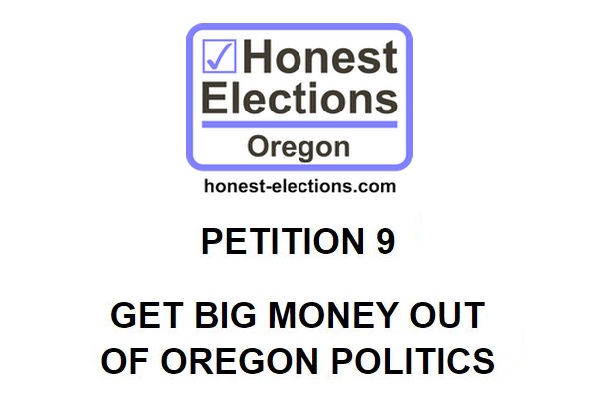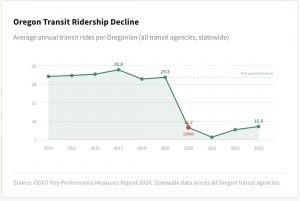The Oregon Legislature will never enact meaningful campaign finance reform
6 min read
by Marty Wilde
Reform of Oregon’s anything-goes system of campaign financing cannot rely on the Oregon Legislature. Everyone currently in elected office in Salem got there under the same system, one fueled by unlimited campaign contributions.
Oregonians overwhelmingly support capping political donations, with 78% voting in favor of the constitutional amendment allowing caps (80.2% in Lane County). Nevertheless, the Legislature has repeatedly refused to enact caps, leaving Oregon among only five states that lack them.
The reasons for this are simple: Campaign contribution caps would require candidates to spend more time on fundraising, disempower the organizations that use the existing system to buy influence, and incentivize independent expenditures that cost those organizations more money.
Small donor / voter financing takes more effort. Fundraising is hard work. Running in an Oregon House swing seat in 2018, I spent about half my time raising money. I still only managed to bring in about a third of my fundraising total from my own efforts with small donors, a relatively high proportion of small donors in a swing seat.
Despite the challenges of running a small donor campaign, I found it rewarding. Having to ask constituents for their hard-earned money made me attentive to their concerns. I learned a great deal from those conversations. Unfortunately, few politicians want to put in the work to connect personally with hundreds or thousands of small-donor constituents, when it’s much easier to rely on a few large donors.
Large donors. In politics, money buys access and results. Look at campaign finance reports in contested races, and you will see three types of large donors: advocacy groups; unions/corporate groups; and caucuses or fellow caucus members. Advocacy groups generally support candidates who support their causes and focus on the races where they can make a difference. For instance, I received significant general election contributions from environmental groups who knew I was stronger on their issues than any Republican opponent, while one of my primary opponents received funding from trial lawyers, who knew I was more moderate on theirs.
Members of a group supporting a candidate who shares their values should be free to support that candidate, but when the amounts of money they donate to a candidate they don’t know through an advocacy organization dwarf the amounts that candidates can possibly get from their own small donor voters, that forces candidates to prioritize the advocacy group’s positions over those of their own voters.
Unions and corporations / corporate groups. While some may object to lumping unions in with corporations, they play the same role, just (usually) on different sides of the issues. Both move large amounts of money and can effectively buy primaries outright and significantly influence general elections. I recall one instance of a single corporate executive buying a Republican House primary for $50,000, while a union spent about $800,000 in last-minute spending a few years ago, buying the Secretary of State Democratic primary.
With their ability to move large amounts of money on short notice, these groups dominate late spending on the most expensive parts of campaigning – television and radio ads. In return, they get access and influence. While I never saw an instance where I believed a group had bought a vote, I also never saw a legislator refuse a meeting with a large donor.
Caucus dues and party discipline. Members of the same party become part of the party caucus when they are elected. Caucuses also move large sums of money. At least on the Democratic side, these sums come from “dues” paid to the caucus by its members. This creates a fund that acts as an insurance policy. If a candidate’s race becomes unexpectedly close, the caucus will swoop in to save the day. If not, the dues paid by a candidate go to a more closely-fought campaign. (Party leadership assignments were also heavily influenced by fundraising prowess.)
This system cements party loyalty. When caucus members take a stand against their party, they risk losing support in the next election. I stopped attending House Democratic Caucus meetings in the summer of 2021, when I received a legal opinion indicating that our meetings violated Oregon’s open meetings law. But I kept my decision to myself until after I was gerrymandered out of my seat and could not continue in the Legislature.
Whether you call my delay cowardice or pragmatism, the reality is that unlimited donations from party institutions require loyalty to the party over loyalty to the voters and sometimes even the law. By refusing to break Oregon’s open meetings laws, I effectively cut myself off from a significant portion of the potential funding for any future campaign.
Independent expenditures. If large donors can no longer move huge sums of money into campaigns, they will spend it on independent expenditures. As these expenditures are not coordinated with campaigns, they are often used to fuel negative campaigning (or to respond to it).
As an example, when Sen. Jeff Golden refused to take money from large donors in his campaign, outside groups nevertheless spent that money to support his candidacy. Don’t get me wrong – Jeff was very brave to do what he did. I have always supported strong campaign finance reform, but I accepted the money, taking the pragmatic view that if I didn’t get elected, I could not advocate for change. Nevertheless, I believe I had the most individual donors of the caucus in 2018, and I know I knocked on more doors than anyone else – 11,000 in that race alone.
It is not a zero-sum game, however. Candidates receive preferential rates for television and radio ads, which are often one-third to one-half the price of independent expenditures. So, while critics of campaign finance reform are correct in claiming that caps would push money into independent expenditures, these expenditures would have less bang for the buck. It is for this reason that large donors do not want campaign contribution caps. Caps significantly reduce donors’ ability to influence the public through spending.
Looking to the future. Where does this leave us? The Legislature is currently struggling to write a campaign contribution caps law. While we might see this as a laudable effort on the surface, the reality is that they are capping only individual donations, while preserving exceptions that allow unions, corporations, and caucuses to move unlimited amounts.
I hope you will support Honest Elections Oregon, the group pushing the strongest campaign finance proposal out there. It is the fear that their initiative petition will pass that is pushing the Legislature to pass a campaign finance bill that will make the problem worse. Oregon deserves clean, voter-funded elections.
Despite Oregonians’ clear desire to limit the influence that corporations and other large donors have on politics, the Legislature is trying to increase their influence even further, to the detriment of voters and small donors. This attempt to claim virtue while committing vice is the pinnacle of cynicism in a business already known for its hypocrisy.
Marty Wilde represented central Lane and Linn counties in the Oregon legislature. For more of his Letters From a Recovering Politician, subscribe at https://martywilde.substack.com/subscribe. He submitted the following written testimony Feb. 23 on HB 4024:
I write in opposition to the -3 amendments to HB 4024. I see several problems, including, but not limited to:
- The $3,300 cap is far too high;
- By allowing donations from “people” instead of “individuals” it allows donations to be made through corporate entities like LLCs from essentially the same people who donated individually;
- The provisions for small donor PACs allow the same manipulation of elections through late spending that have plagued Oregon for decades; and
- Finally and most critically, releasing the amendment language one day before a public hearing shows contempt for the voters by denying them a meaningful opportunity to provide input.
Let’s be honest here – this is a backroom deal cut in fear of a ballot measure, not an honest attempt to give voice to the 78% of the voters who voted for Measure 107.
You should not be a party to the subversion of democracy. It would be better to simply get out of the way and let the voters decide.






